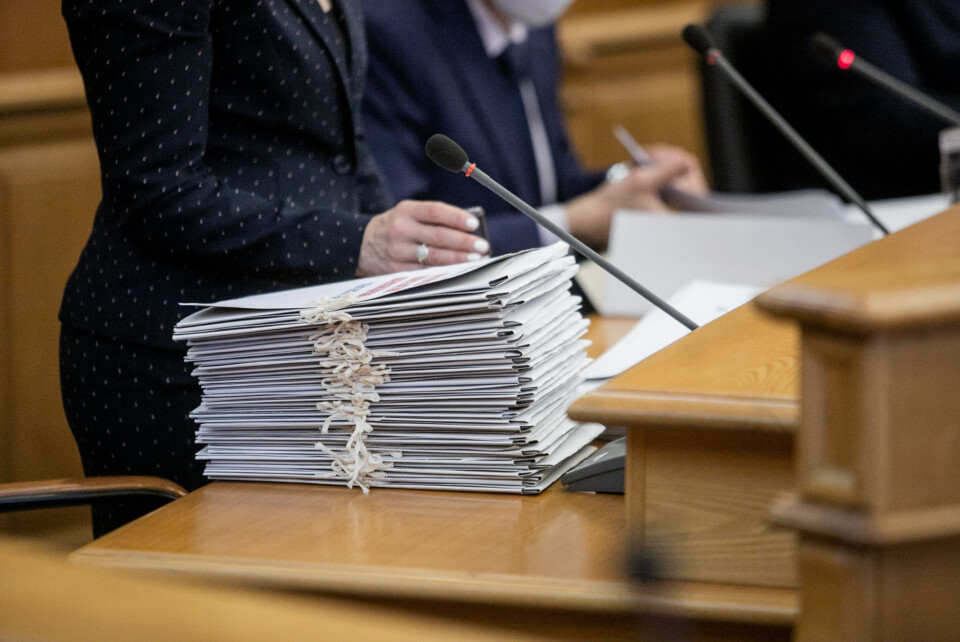-
Letters: Vaccination campaigns are not straightforward in rural France
Connexion reader says that local GP needed to convince enough patients before setting a date
-
Letters: Reader views on Macron's snap election
One reader felt echoes of the UK's 2016 Brexit vote in the announcement
-
Comment: France has entered its ‘deckchairs on the Titanic’ moment
Electoral manoeuvring has made a mockery of democratic values, argues political commentator Simon Heffer
Underpaid, undervalued, overworked: French judges are at crisis point
An American lawyer practising in France since 1973 says the mammoth workload means cases often have to be treated in just 10-15 minutes

In November 2021, roughly 60% of France’s 8,500 judges published a petition to call attention to the degrading conditions in which they work. A thousand court clerks added their signatures.
Céline Parisot, the president of the main union of French judges [in an interview] lamented that “Judges don’t have time to listen to the parties. Justice is to bring social peace.
“If there is no time to listen, one cannot make good decisions; one cannot give the parties to the litigation the feeling that they have been heard and that justice has been rendered.”
At the end of 2019 there was a backlog in the French courts of 1.8 million civil cases. In contested divorce cases a judge may have only 15 minutes to deal with a case and no time to allow the parties to speak.
Criminal judge said she had to treat 17 cases in four hours, allowing 14 minutes per case
A judge handling criminal cases said she had to treat 17 cases in four hours allowing only 14 minutes per case. French judges are saying in public they lack the means to do their job, that they are exhausted, and feel their task no longer makes sense.
The complaint is by no means illusory. Summoned to appear at 9:00 at the Family Court in Aix-en-Provence (where I practise) we will find a list of 15 to 20 cases to be dealt with by a single judge by the end of the morning.
Some of those cases will be postponed to be heard another day, but there will normally remain 10 or more cases with the judge rarely spending more than 10 or 15 minutes on each case.
French judges work alone, and there are few of them. Eleven judges per 100,000 inhabitants compared to a European average of 21 per 100,000. France spends a mere 0.2% of its GDP on what it categorises as “justice,” well below the European average.
Read more:Why are there so few lawyers in France compared to US?
Of the €13billion budget allocated to the Ministry of Justice only 31% or about €4billion goes to the judiciary. By way of comparison the operating budget of Harvard University in 2020 was $5.4 billion. Just over half of the French justice budget goes to the prison system. The annual salaries of French judges range from about €42,000 to about €75,000 which compares pitifully to the £172,753 of an English High Court judge or $218,000 of a US federal district court judge.
It has been over a century since the US Congress granted federal judges a special allowance to hire a ‘stenographic clerk’ and a law clerk. Today all US federal judges have at least one law clerk who has completed law school and is admitted to the bar. Those jobs are prestigious and coveted by young lawyers.
If the French government were to sponsor a law to provide funds so that judges could hire young lawyers as law clerks, it would not only create jobs, it would improve the quality of judgments. It would boost the quality of the legal profession as those clerks would, as in the United States, spend a year or two as a judge’s clerk and then move to a law firm with their legal education much enhanced.
Why does France underfund its judiciary?
Whether justice is thought to be social happiness (Hans Kelsen), fairness, (John Rawls), open impartiality, (Amartya Sen) or the fulfillment of expectations, as expressed in my own effort in Justice After Darwin, French judges clearly feel that they are not dispensing it. Both lawyers and their clients suffer from the lamentable conditions that French judges must endure.
There is, alas, nothing new about the current malaise save that it may be a bit more acute than in the past. France has always underfunded its judiciary. French judges have historically been underpaid and subjected to substandard working conditions.
It is fair to ask why this is so. Why does France undervalue its judiciary? While no French public figure would dare admit such a heresy, it is unquestionably true as can be seen if the French judiciary is compared to those of other countries, particularly, but not only, those of Common Law countries. There is no easy answer to the question.
It was a French historian who began his multivolume tome on the history of France by pointing out that France has been a monarchy for 1,000 years and a republic for 100. If all power is located in the monarch, the judiciary, if it exists at all, is a sideshow. France is no longer a monarchy, but as a long-time observer of the French judiciary, it seems at times as if it is indeed a sideshow.
Ronald Sokol is a practising lawyer in Aix-en-Provence. He is a member of the bar in France, England, and the United States and the author of Justice after Darwin, and other works.
Related articles
France aims to make accessing free legal aid easier
Calls to bring back guillotine ‘defy French law’























